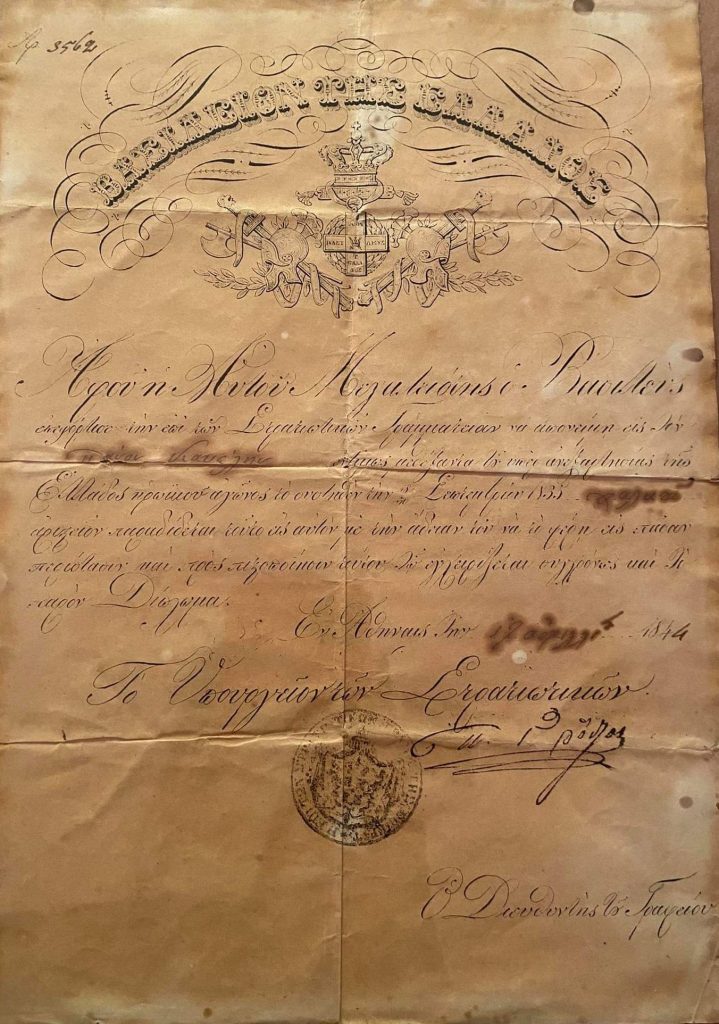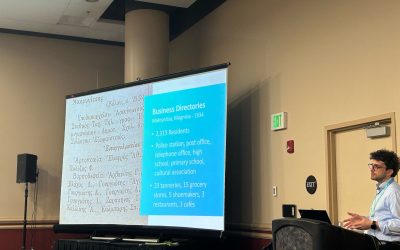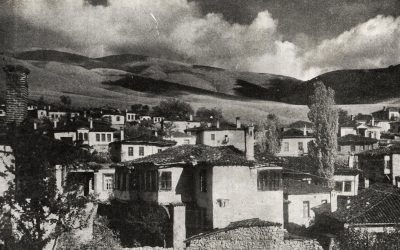By Gregory Kontos, Historian & Founder of Greek Ancestry
Introduction
After the Greeks’ long and painful struggle for their national independence (1821-1829), they naturally held great expectations for Otto’s Regency Council. However, the Council of this infant and already in-debt state decided to man the army with Bavarians and was incapable of maintaining all the irregular Greek troops, which it dissolved in March 1833. The dissolution of the irregular military coupled with the Council’s general military policy resulted in the disappointment of the Greek warriors, intense reactions, and anarchy.
To alleviate people’s frustration, one year later in June of 1834, the Council issued a decree “for the recognition of the services” of the warriors. According to the decree, every officer, noncom, and soldier who had fought during the national struggle was to receive a “Distiction” (Gr. Ἀριστεῖον, Fr. Médaille) as well as all respective privileges—including honorary seats in local celebrations, the permission to own guns, and exemption from public works. Silver medals were designated for officers, while bronze and iron medals were given to noncoms and soldiers, respectively. These medals would be situated on the left side of the chest with a blue strip. The decree also determined criteria for beneficiaries, restrictions, and conditions of “Distinction removal.” In the following years, additional decrees clarified criteria further.
The Council’s goal was met with success from day one with thousands of former warriors applying for Distinctions. Indeed, the degree of people’s interest is clearly demonstrated by the extent of the associated archival collection at the General State Archives of Greece, consisting of 312 folders.

Zooming in locally
The residents of the Municipality of Geronthres, based in Geraki, Lakonia reacted with a similar zeal. According to lists of the Distinctions collection, at least 21 Gerakites received a Distinction in 1844 alone, including prominent local figures, such as former mayor Nikolaos Oikonomos, former deputy mayors Panos Kanellis and Georgios Karamanos, a few municipal councilors, and other powerful men of Geraki like Panos Manokas. In preceding and following years to 1844, even more Gerakites likely received Distinctions, as former applications and other documents in the archives suggest.
The importance of the Distinctions collection is undoubtedly great, not only because it provides lists of the locals who participated in the struggle, but also—and most significantly—because its documents shed light into the local society of the early 19th century. It is thus most fortunate that the General State Archives has digitized this collection and also indexed a considerable part of it.
Petitions & Complaints
Below are three representative samples of petitions and complaint reports of Gerakites, which are quite relevant not only to the social history of Geraki, but also to the broader subject of the Distinctions. The first two are petitions for a Distinction (1839), while the third one is a complaint for the “paradoxical” offer of a Distinction to four locals (1841).
Petition I
[Source: GSA/GAK, Central Office, Distinctions, F. 26, D. 58]
Agios Vasileios
April 25th, 1839
To the Mayor of Glypia
A resident of the village of Geraki of the Municipality of Geronthres, son of Ioannis Gerakos and Diamanto of the same village, aged 45, I participated in our national struggle and fought at the sieges of Tripoli and Nafplio, at the battles against Dramalis and the Arabs, under the command of D. Tziokris. On time, the warlord of the Municipality of Glypia, Mr. G. Kelperis, with whom I served, presented a list of those who fought in that time, including me. This list has been certified by our leader, Mr. Tziokris. […] I ask that my report is forwarded to where it belongs, and that I receive the national Distinction.
Your obedient and loyal subject,
Giannakis Gerakos
Petition II
[Source: GSA/GAK, Central Office, Distinctions, F. 33, D. 413]
Geraki
August 30th, 1839
To the Mayor of Geronthres
I, the undersigned, born and residing in Geraki of this Municipality, have already reached the age of 40 years. Through this letter, I rush to report to you, Mr. Mayor that in year 1836 I repeatedly submitted both to the Administration of Lakedaimona and directly to the Distinctions Committee in Athens certificates for my military and political services to the country throughout the period of the struggle, but to this day, I have not been granted the Distinction. […] Mr. Mayor, I ask that you forward the present to where it belongs, so that I am at least granted the appropriate Distinction, as a reward for my services.
Obedient,
Anagnostis Nikolaou Papa-Georgiou
Complaint
[Source: GSA/GAK, Central Office, Distinctions, F. 66, D. 11]
Geraki,
December 26th, 1841
To the Royal Military Secretariat of the State
To the Archive.
The complaints are motivated by personal feelings.
Informed that some of our compatriots, Mr. Georgios Karamanos, Athanasios Konstantios, Ioannis Kalomoiris and Michail Mitos, […] were included in a report for those eligible to receive a Distinction, the undersigned [report that] the aforementioned did not participate in any battle of the Holy struggle. Georgios Karamanos was residing in Hydra; Athanasios Konstantios was in Geraki, a gunsmith and carpenter; Ioannis Kalomoiris was in Geraki, a doctor; and Michail Mitos was in Leonidion, a sardine-seller and grocer. And these people do not even have an idea where the places they claim they served at are, therefore greatly deceiving the government. We can prove all this with precise information.
To certify the above, we also recommend witnesses: Mr. Panos Manokas, Panos Kanellis, Moiras Moiropoulos, Mitros Manokas, Panos Doulfas, Georgakis Mourtzikos, Nikolaos Giannakos, who are residents of the village of Geraki of the Municipality of Geronthres. And, if the Royal Secretariat approves, we can add more witnesses to further confirm our word.
Respectfully signing,
The obedient residents of Geronthres,
Dimitrios Kostouros, Zanetos Kouris
Commentary
We are not certain whether or not Giannakis Gerakos received the Distinction after his petition. Given that his name was mentioned in an 1844 list of Distinction receivers and assuming this Giannakis is, in fact, the same man as the one in the petition, it would appear he eventually was a recipient. However, his petition provides an idea of what a “typical” Distinction petition looked like. It contains the necessary certifying information, which the applicant had to present, along with the references to important warriors of the area, such as warlord Georgios Kelperis and Argian general and politician Dimitrios Tsokris. Interestingly, both petitions include references to Article 22 of the Penal Code, as, according to the Decree of June 3rd 1834, a Distinction could not be awarded to those who had been convicted or to those who were in trial either for a misdemeanor or felony. In those cases where a Distinction had been awarded to someone who was later convicted, it had to be retracted retrospectively.
It seems that the petition of Anagnostis Papageorgiou, former elder [δημογέρων, dimogeron] of the village, was also successful. Indeed, Papageorgiou had a leading role among Gerakites during the Revolution, which is confirmed by a certificate provided to him on February 25th 1844 by Petros Mavromichalis of the prominent family, Nikitaras (also known as “Turk-eater”), A. Tsokris, Petros Varvitsiotis, and Kanellos Deligiannis. In this certificate, the warlords confirm that not only did Papageorgiou serve the country militarily and politically—participating in the battles of Valtetsi, Trikorfa, Vervena, Doliana, Tripoli, Argos and Nafplio—but that he also spent considerable amounts of his own fortune to fund the soldiers. Consequently, on September 5th 1839, the Administration of Lakedaimona forwarded Papageorgiou’s petition to the Royal Military Secretariat, which, on March 11th/23rd 1840, sent a bronze Distinction with a strip and diploma to the Interior Secretariat. These were then forwarded to the Lakedaimona Administration and eventually to the beneficiary.
The reaction to the complaint of Dimitrios Kostouros and Zanetos Kouris was the opposite, and it is interesting how the report and the case were sent to the Archive. In fact, one month after the report, its receiver noted, “To the Archive. The complaints are motivated by personal feelings.” The date of this comment, only one month after the composition of the document in Geraki, makes it clear that no investigation of the complaint took place. That is, the clerk decided not to look further into the matter, perhaps considering it a product of personal conflicts between the locals. However, one of the accused Gerakites, Ioannis Kalomoiris, a doctor who had also served as an elder [πρόκριτος, prokritos] and Mayor in 1844, had been the target of another accusation only three years prior. The fact that both the accused and the families of the accusers (the Kouris family and Dimitrios Kostouros himself) were engaged in the municipality’s politics, at least in 1844, suggests the possibility of a personal dispute. Michail Mitos and Georgios Karamanos, two more of the accused Gerakites, were also engaged in politics in 1844. This is indeed the same time period when a general dispute appears to have taken place in Geraki.
However, we cannot be certain of the validity of the accusation, nor of the exact circumstances under which it was formed. Besides, the clerk’s comment about “personal feelings” does not exclude the possibility of the accusation’s validity. In any case, what is most important is the conclusion that one draws after reading the presented documents consecutively. It becomes evident that the Distinction petition did not always guarantee a successful outcome, even if it provided the necessary confirmative information. The initial petition of Anagnostis Papageorgiou, dated in 1836, confirms this notion. Even in cases when the result was positive and the warrior was compensated—at least symbolically—for his struggle, problems could arise later on, perhaps due to personal disputes between compatriots.
What all these examples indicate is that Distinctions were valued greatly. Distinctions were a source of pride and satisfaction for those who fought for the liberation of the country, even if they were not accompanied by significant privileges or financial benefits. This value of the Distinctions explains the great number of applicants and beneficiaries we see. A demand for justice around such an issue of “holy and national character” also explains, at least partly, the great number of complaints and accusations that took place in that time period.
[This is a shortened version of an article published in the Journal of Peloponnesian Studies (Peloponnisiaka) in 2018: Κόντος, Γ., «Αριστεία Γερονθρών», Πελοποννησιακά, 2018, τ. ΛΑ΄, 549-562.]



